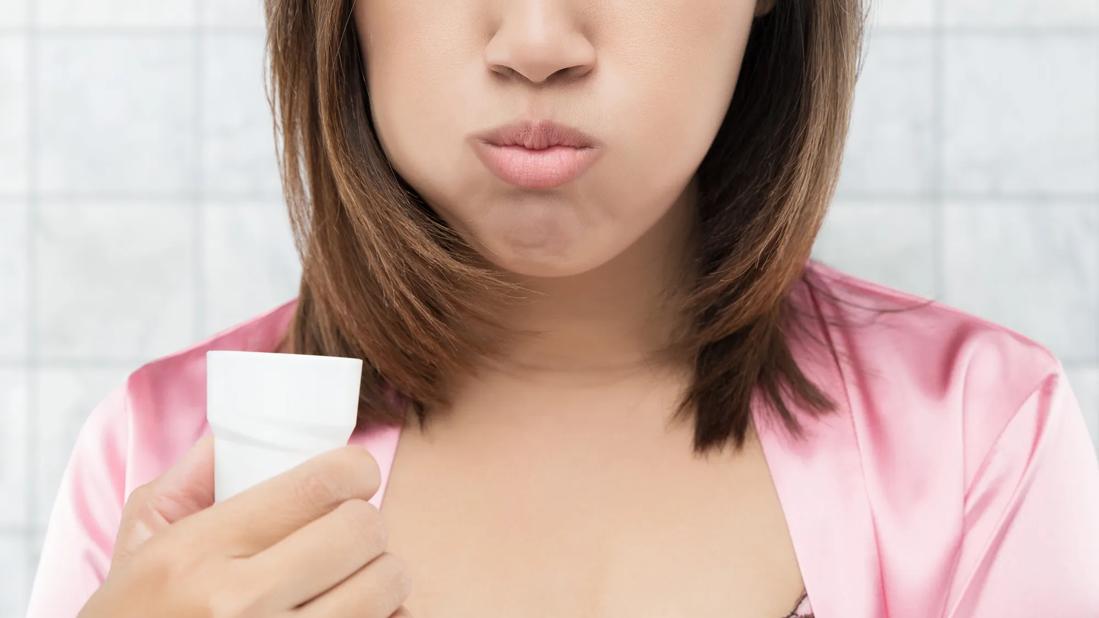This medicated liquid is available by prescription only and is specially formulated for your specific needs

Image content: This image is available to view online.
View image online (https://assets.clevelandclinic.org/transform/98edc4e0-7204-4aa8-b32f-614133c06065/using-mouthwash-913942998)
Person holding small cup, swishing mouthwash in their mouth
When you’re dealing with mouth sores, it can be hard to eat, drink or even swallow without pain. But a prescription-only option called “magic mouthwash” may be able to bring some relief.
Advertisement
Cleveland Clinic is a non-profit academic medical center. Advertising on our site helps support our mission. We do not endorse non-Cleveland Clinic products or services. Policy
Internal medicine doctor Janet Morgan, MD, unlocks the science behind the so-called magic.
“Magic mouthwash” is an umbrella term for prescription mouthwash that can help relieve and even prevent mouth sores (oral mucositis).
“Sometimes, the mouthwash itself can be the treatment for whatever is causing mouth sores,” Dr. Morgan says. “But more often, we use it to temporarily relieve pain or swelling while we wait for other treatments to resolve the underlying problem.”
Your doctor may prescribe magic mouthwash if you’re experiencing mouth sores as a side effect of:
Advertisement
Oral medications, like pills, can interact with other medications you’re taking. But mouthwash is a topical treatment, which means it only targets the area of your body that’s affected — in this case, your mouth.
“For that reason, we prefer to start with a topical option whenever possible,” Dr. Morgan says.
The name “magic mouthwash” sounds casual, like maybe this is something you could whip up at home. But it’s a medication, so you should never try to make it on your own. Leave that to the pharmacist!
Plus, magic mouthwash is custom-made for the person it’s prescribed to, so its ingredients vary.
“Every formula is different and depends on the specific needs of the person it’s made for,” Dr. Morgan explains. “So, what’s in your version of magic mouthwash isn’t necessarily what’s in someone else’s.”
Depending on the cause of your mouth sores, your prescription may contain one or more of these ingredients:
You might also hear magic mouthwash referred to as miracle mouthwash or mixed medicated mouthwash. And certain formulations go by nicknames of their own, though the formulas may still differ:
There’s one big benefit to using magic mouthwash: It can help relieve the pain of mouth sores. But you may experience some side effects, too, depending on the ingredients in your specific formulation.
Side effects may include:
If your prescription calls for you to swallow magic mouthwash (more on that in a moment), you may experience other side effects, too, like:
Most people are instructed to swish with magic mouthwash and then spit it out — usually every four to six hours as needed for relief from pain and inflammation.
You should always follow guidance from your doctor and the instructions on the packaging of your medication. But it usually goes something like this:
Advertisement
“Basically, you use it like you would normal mouthwash,” Dr. Morgan points out.
She notes that there are times when your provider may instruct you to swallow your magic mouthwash instead — particularly if you have sores in your throat. But unless you’ve been specifically advised, stick to swishing and spitting.
Dr. Morgan shares some more suggestions for magic mouthwash success:
Advertisement
Oh, and one last thing: In this instance, sharing is not caring.
“Because the formulas differ, never share your magic mouthwash with other people unless you have an explicit go-ahead from your provider,” Dr. Morgan stresses. “Even if two members of your family both have strep throat, talk with your provider before sharing.”
Advertisement

Sign up for our Health Essentials emails for expert guidance on nutrition, fitness, sleep, skin care and more.
Learn more about our editorial process.
Advertisement
For fresher breath in the a.m., practice good oral hygiene, including flossing your teeth and scraping your tongue
These common mouth sores are very different — cold sores are caused by a virus and are contagious, but canker sores aren’t
Lots of things can activate the herpes simplex virus, from the common cold and cold weather to cracked skin and cosmetic procedures
This oral health practice doesn’t have proven benefits, and it’s not a substitute for brushing and flossing
Prescription oral antivirals are your best bet, but OTC creams can help, too
Stay hydrated, use a humidifier and try sugar-free candies or over-the-counter products with xylitol
Non-cancerous ulcers usually heal within a few days or weeks — if it’s sticking around, it’s time to get it checked
Get quick relief with ice chips, popsicles, milk and saltwater
Prioritize your health by managing stress, strengthening your social connections and getting quality sleep
Bolsters, blankets, pillows and blocks can offer extra support, stability and comfort
Allergies, postnasal drip, asthma or reflux could be to blame for a cough that won’t quit